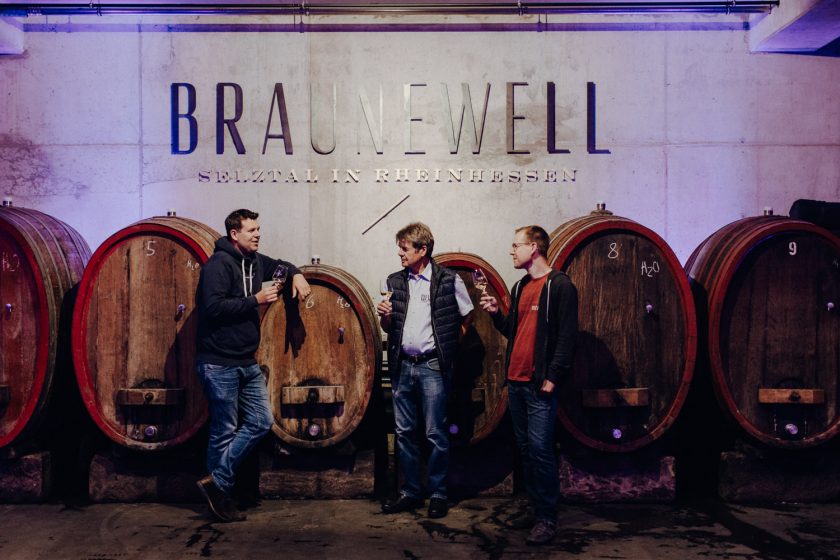Braunewell
Weingut Braunewell (27 hectares)
Essenheim / Rheinhessen / Germany
Braunewell is located in the village of Essenheim, not far from Nierstein in the Rheinhessen hinterlands. Just 12km southwest of Mainz, Essenheim is in the Setztal, an area just south of the Rhein, which is marked by a persistent wind, and just 8km south of the Rhein river. Driving up from the south, one can see that Essenheim is home to steep and imposing a hillside, jutting out from the generally rolling landscape. The estate is a family run enterprise, with 27 hectares, operating with wisdom, sentiment, and competence. The family is serious about what they do, making wines with care and craftsmanship – it’s not an estate run by amateurs. Braunewell is contemporary, but not “modern”; it has soul and character. In general, the soils are very unusual for Rheinhessen; limestone and limey marl and loess, and only a little clay. Stefan Braunewell and his brother Christian, the third generation at the estate, aim to produce wines that are “salty and quivering,” and “less relaxed” than many Rheinhessen wines.
To the east of the village, Teufelspfad is an extraordinarily varied vineyard site and different varieties are favored, based on the parcel and soils. Riesling is grown mainly in two parcels “Zu Morruff” and “Am Klopp”, which have Terra Fusca, the limestone rich soils most commonly found in the Mediterranean. These parcels are steep (30%) and allow for good drainage, perfectly suited to Riesling. Further down the slope are calcareous parcels “Am Stadeckerweg”, “Am Millesand” and “Am Teifelspfad”, where Pinot Noir and Pinot Gris are planted. To the west, are “Im Brinkel” and “Am Holler”, where Pinot Noir is also planted, producing stronger and more powerful Pinot. To the south is “Reitenberg”, again with a 30% incline and loess and sandstone soils, where Riesling again is favored.
Blume is of the most famous locations in the northern Selztal, the name of this area, which takes it’s name the village just to the west of Essenheim. Blum is named for the parcel “In der Blum”, but the etymology here isn’t known. The wines do carry a certain floral aroma, but Braunewell isn’t convinced that this is the sole reason for the name. The soil is characterized by strong, tertiary marl with a high proportion of fossil bearing limestone here. The site was too steep for tractors, so to make working the vineyard easier, terraces were created. Blume is planted mostly to Riesling and Pinot Noir which express the mineral and fresh side of these varieties.
- Vineyard Area: 27 hectares
- Annual Production: 220,000 bottles
- Founded: 1655
- Top Sites:
- Essenheimer Teufelspfad: Calcareous, limestone rich
- Elsheimer Blume: Tertiary marl with lime
- Essenheimer Klopp: Barren limestone
- Grape Varieties: Riesling, Scheurebe, Pinot Gris, Sauvignon Blanc, Pinot Noir, St. Laurent




